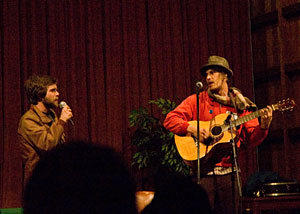Note: This is another in a series of posts from Eco-Farm, the annual conference held by the Ecological Farming Association of California. At Eco-Farm, some 1,400-1,500 organic farmers, Big Organic marketers, and sundry sustainable-ag enthusiasts pack into a rustic, beautiful seaside conference hall an hour-and-a-half south of San Francisco to talk farming amid the dunes.

Eco-Farm is a bit like summer camp for sustainable-ag nerds. You wind up outdoors a lot, wandering from activity to activity, often pelted by rain. I loved it. No brain-sucking hotel conference hall, no day upon day of artificial light and processed air. Break-out sessions took place in scattered arts-and-crafts bungalows, linked by trails through the rolling dunes. The low roar in the background was not some infernal highway; rather, waves lashing up against a rocky shore.
What sort of people thronged this sea-side paradise? About what you’d expect. The gently aging front line of that first great wave of back-to-the-land farming zeal of the early ’70s: Dudes with tremendous gray beards, some with matching beret-capped dreadlocks; sensibly shod ladies swathed in earth tones.
Young folks mixed among these wizened survivors, and lots of them: the new wave of microfarmers and food-justice and green activists, some of them as hippied-out as their elders, some with a more urban-hipster aesthetic, and others still sporting what I call “farm metro”: Carhartt trousers and Blundstone boots.
Judging from Eco-Farm’s sponsor list, I assume there must have been some corporate types lurking among us, but I didn’t encounter many personally.
For me, a new-wave east coast farmer (and former Texan), California — particularly its northern half — has long represented a kind of sustainable-ag mecca: the land of (raw, pastured) milk and honey.
Here are some of my impressions from Eco-Farm.
- Small-scale sustainable agriculture has become a site of activism. I’ve attended several annual conferences of the Carolina Farm Stewardship Association — North and South Carolina’s version of Eco-Farm — and have been impressed by the upswing in political energy around farming. But at Eco-Farm that energy seemed ratcheted up a notch. Some sessions had the buzz of an anti-war rally — young folks and elders plotting an assault on industrial food. And nametags revealed the presence of a veritable gaggle of sustainable-ag and food-justice NGOs. Speakers talked often of “the movement,” and that rubric seemed fitting.
- And yet, sustainable-ag remains a passion limited largely to white, middle-class folks. Eco-Farm displayed a broad diversity of ages and sartorial styles. Ethnically, though, a kind of monoculture flourished. That fact was seldom mentioned; and only with a dose of self-flagellation. What was missing, though, was analysis. Why are so few non-whites drawn to small-scale farming? I never heard the question come up. Like the national food-justice movement, the California contingent has failed to open a broad and sustained conversation on food, class, and race. Indeed, the whole question was essentially relegated to a single informative session on urban farming. I think the vexations of food and class will have to be fully aired and addressed for the sustainable-food movement to move beyond niche status. But the lack of discussion at Eco-Farm doesn’t mean there isn’t plenty of powerful activism around food in low-income, minority-dominated areas in California. In the next days, I plan to visit and post about San Francisco’s Alemany Farm and Oakland’s People’s Grocery.
- Sustainable ag has become a vocation not unlike that of art. The hours are long, the pay sucks, and failures are commonplace. But the work also offers ample opportunity for creativity and vision, and triumphs are exhilarating. That description applies to the life of a musician; it also works for someone setting out to make a living from the land. (One difference: Musicians can at least dream of big bucks; farmers, not so much.) The insight is probably banal, but here goes: Since its first stirrings back in the days of Rodale in the 1950s, the alternative-farming life has always drawn people with lots of creative energy, which often bubbles into letters, music, painting, and other art forms. Eco-Farm offered plenty of confirmation for that observation — particularly the talent show. A young farmhand delivered an offbeat, weirdly affecting spoken-word bit about lonesome talks over beer with his scarecrow ladyfriend; an elder took a virtuoso turn on a pair of bongos; there was a soaring aria, and a sing-along farm song straight from 19th century New England. Two young fellows delivered a fabulously silly cabaret act; and the audience endured at least one earnest earth dance. My favorite bit was when two young urban farmers, pictured above, gave a spirited, and yes, talented, version of Beck’s “Satan gave me a taco.”


